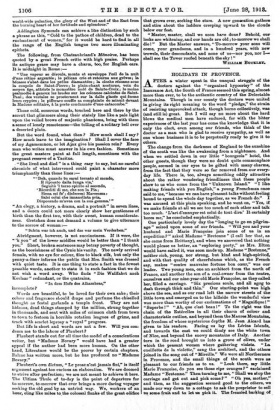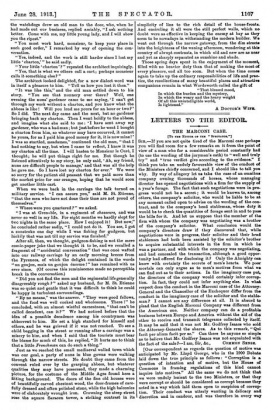HOLIDAYS IN PROVENCE.
AFTER a winter spent in the unequal struggle of the doctors against the " organized hypocrisy" of the Insurance Act, the South of France seemed this spring, almost more than ever, to be the authentic country of the Delectable Mountains. Though in our county the doctors were united in giving its right meaning to the word "pledge," the strain of resisting unprovoked attack, though borne collectively, was (and still is) great. But I will say no more about the hard blows the medical men have endured, for with the bitter experiences of the last year has come the knowledge that it is only the elect, even among our friends, who think of the doctor as a man who is glad to receive sympathy, as well as one whose business it is to be perpetually ready to give it to others.
The change from the darkness of England to the sunshine of the south was like the awakening from a nightmare. And when we settled down in our little "bourgeois" hotel, the other guests, though they were no doubt quite commonplace people, seemed in our eyes to be gifted with many charms, from the fact that they were so far removed from our every- day life. There is, too, always something oddly attractive about the rather wondering friendliness that these people show to us who come from the " Unknown Island." " I like making friends with you English," a young Frenchman once said to me," because we can have pleasant talks without feeling bound to spend the whole day together, as we French do." I was amused at this plain speaking, and he went on, "Yes, if we make friends at all we see too much of each other and talk too much. L'art d'ennuyer est celui de tout dire.' It certainly bores me," he concluded emphatically.
One particularly lovely day the "longing to go on pilgrim- age " seized upon some of our friends. " Will you and your husband and Marie Francoise join some of us in an expedition ? " asked Madame "Bretonne (I call her that, as she came from Brittany), and when we answered that nothing would please us better, an "exploring party," as Mrs. Elton would have called it, was soon made up. Madame "Bretonne," neither rich, young, nor strong, but kind and high-spirited, and with that quality of cheerfulness which, as the French say, makes " centre mauvaise fortune bon cceur," was our leader. Two young men, one an architect from the north of France, and another the son of a coal-owner from the Centre, ourselves and our nine-year-old Marie Francoise, as they called her, filled a carriage. "Six precious souls, and all agog to dash through thick and thin." Our starting-point was high above the sea, and as our road left the narrow streets of the little town and emerged on to the hillside the wonderful view was more than worthy of our exclamations of " Magnifique ! " "Superbe !" " Ah, que c'est beau!" To the right was the chain of the Esterelles in all their charm of colour and characteristic outline, and beyond them the Meares Mountains, the freedom of whose mysterious depths M. Jean Aicard has given to his readers. Facing us lay the Lerins Islands, and towards the east we could dimly see the white town of Nice, and beyond the snowy mountains of Italy. Another tarn in the road brought us into a grove of olives, under which the peasant women where gathering violets. " La cueillette de la violette," sang the architect, and the others joined in the song out of "Mireille." We were all Northerners in Provence, and the small things of the south were as pleasant to our friends as to us. " Look there, my little Marie Francoise, do you see those ripe oranges ?" exclaimed Madame "Bretonne." Then turning to me, " Shall we stop the carriage and get out and pick some P " " Oh yes, mother," and then, as the suggestion seemed good to the others, we made our way down to a cottage to ask the proprietor to sell us some fruit and to let us pick it. The frenzied barking of
the watchdogs drew an old man to the door, who, when be had made out our business, replied amiably, "I ask nothing better. Come with me, my little young lady, and I will show you the ripest."
" You must work hard, monsieur, to keep your place in such good order," I remarked by way of opening the con- versation.
" Yes, indeed, and the work is still harder since I lost my little charton,' " he said sadly.
" Your little charton' ?" repeated the architect inquiringly. "Yes, that is what we others call a cart; perhaps monsieur calls it something else? "
The architect looked delighted, for a new dialect word was in itself a pleasure to him. "Tell us how you lost it then."
"It was like this," and the old man settled down to his story. "You see that nunnery over there? Well, one
evening the nuns' gardener came to me saying, can't get through my work without a charton, and you know what the abbess is like ! Will you lend me yours for an hour or two ? ' So I did. The next day came and the next, but no gardener bringing back my charton. Then I went boldly to the abbess, and imagine what she said to me : have sent away my gardener, who was a bad man ; but just before he went I bought a charton from him, so whatever may have occurred, it cannot be yours, for as I paid him good money for it, it is now mine! ' I was so startled, mesdames," continued the old man, " that I had nothing to say, but when I came to reflect, I knew it was my charton all the time. I will hasten to Monsieur le Cure, I thought; he will put things right for me. But though he listened attentively to my story, he only said, • Ali, my friend, nuns are difficult people to manage,' and that was all the help he gave me. So I have lost my charton for ever." We were so sorry for the patient old peasant that we paid more than the market price for our oranges, hoping that he would soon get another little cart.
When we were back in the carriage the talk turned on military service. "I can assure you," said M. St. Etienne, "that the men who have not done their time are not proud of themselves."
"Where were you quartered ?" we asked.
"I was at Grenoble, in a regiment of chasseurs, and was never so well in my life. For eight months we hardly slept for twc nights in the same place. How I enjoyed it ! But now," he concluded rather sadly, "I could not do it. You see, I got a sunstroke one day while I was fishing for gudgeon, but hickily that was not till my service was finished."
After all, then, we thought, gudgeon-fishing is not the mere comic-paper joke that we thought it to be, and we recalled a fragment of "accidental conversation" that was once wafted into our railway carriage by an early morning breeze from the Pyrenees, of which the delight contained in the words "un goujon, mais un goujon enorme ! " has remained with us ever since. (Of course this reminiscence made no perceptible break in the conversation.) " Did you not find the men and the regimental life genes ally disagreeably rough ?" asked my husband, for M. St. Etienne was so quiet and gentle that it was difficult to think he could be happy in turbulent surroundings.
" By no means," was the answer. " They were good fellows, and the food was well cooked and wholesome. There !" he concluded, with an almost wistful earnestness, "that can't be called decadent, can it?" We had noticed before that the idea of a possible decadence among his countrymen was abhorrent to him. He set a high standard for himself and others, and he was grieved if it was not reached. To see a child begging in the street or running after a carriage was a misery to him, and when I said that the tourists must bear the blame for much of this, be replied, "It hurts me to think that a little Frenchman can do such a thing."
Just as we reached the small mediaeval walled town which was our goal, a party of nuns in blue gowns were walking through the narrow streets. No doubt they came from the convent ruled over by the grasping abbess, but whatever qualities they may have possessed, they made a charming picture, for the costume of the Middle Ages found here a fitting background. The doors of the fine old houses were of beautifully carved chestnut wood, the door-frames of care- fully dressed and often polished stone, while the high balconies were of elaborately wrought iron. Crowning the steep street rose the square Saracen tower, a striking contrast in its simplicity of line to the rich detail of the house-fronts. And encircling it all were the still perfect walls, which no doubt were as effective in keeping the enemy at bay as they seem to be nowadays in withstanding the modern builder. We went out through the narrow gateway, from the dim streets into the brightness of the waning afternoon, wondering at this
country of abrupt contrasts, in which old and new are as near and yet as sharply separated as sunshine and shade.
Those spring days spent in the enjoyment of the moment, filled with no heavier duty than that of making the most of every pleasure, end all too soon. But when the time comes again to take up the ordinary responsibilities of life and prac- tice, the recollections of many beautiful places and attractive
companions remain in what Wordsworth called the gift of
"That blessed mood, In which the burden and the mystery, In which the weary and the heavy weight Of all this unintelligible world, Is lightened."
A DOCTOR'S WIFE.



























































 Previous page
Previous page